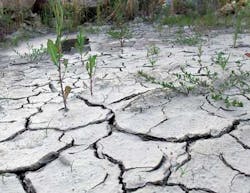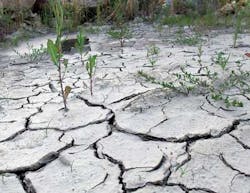Europe/Middle East
Field notes
Threats/opportunities outlined in SIWI report on water and food security
Continuing current trends in food production could lead to increased shortages and intense competition for scarce water resources in many regions across the world, the Stockholm International Water Institute (SIWI) has said.
The findings were documented in its new report entitled "Feeding a thirsty world: Challenges and opportunities for a water and food secure world". It noted that 900 million people are hungry and two billion more people are under nourished in spite of the fact that per capita production continues to increase.
With 70% of all water withdrawals used in agriculture, growing more food to feed an additional two billion people by 2050 will place greater pressure on available water and land.
The authors spotlight a number of essential and largely overlooked challenges where dedicated action can help ensure food security to a growing global population with available water resources.
These included improvements in on-farm water efficiency, reductions in losses and waste in the food supply chain, enhanced response networks to early warning systems for agricultural emergencies, and increased investment to close the gender gap in agricultural production. The findings also investigated the impact of the recent surge in foreign direct investment to lease land in developing countries on local and regional water resources. SIWI said this phenomenon requires more stringent regulation to ensure that the water and land rights of local farming communities are upheld.
Authors behind the report included SIWI, the Food and Agriculture Organizations of the United Nations and the IWMI.
Recycle Phosphorus and prevent future food crisis
Urgent action is needed to reduce the rate of phosphorus depletion, the Chartered Institution of Water and Environmental Management (CIWEM) said in its latest Policy Position Statement (PPS).
The PPS outlines the main issues relating to the world's supply of useable phosphate and highlighted the need for urgent action to achieve its recovery to improve food security and reduce geopolitical risk.
The statement highlighted how the mining of inorganic phosphates are relied upon for agriculture and industry.
At the present rate of extraction, today's phosphate mines will be exhausted by the end of the 21st century and estimates of future reserves range from 200 to 400 years (at the current rate of extraction). China and the USA have both tried to implement measures to reduce exports of phosphate as they have already realised its strategic importance.Wastewater treatment could recover 95% of the phosphate from urban wastewater, the statement said.
CIWEM said land application of suitably treated biosolids (sewage sludge) is invariably the best way to conserve and recycle the phosphate it contains. Currently only 20% of the phosphate in urban wastewater in the EU is recycled.
In order to increase this, CIWEM called on all governments to follow the examples of Sweden and Germany and make phosphate recovery from urban wastewater a legal requirement.
Nick Reeves OBE, executive director at CIWEM, said: "Phosphorus is scarce and resources are being depleted rapidly. To date, attention has focussed on removing phosphate from wastewater streams to prevent the eutrophication of waters.
"But phosphate is of huge strategic value over the longer term and we must also act to recover phosphate from waste-streams for use. The economics of extensive phosphate recovery from wastewater would be quite favourable if we viewed phosphorus as a resource, rather than the conventional approach of treating it as a pollutant in the environment, and mining it in mineral form to fertilise our crops."
Canadian firm Ostara Nutrient Recovery Technologies is working with UK utility Thames Water to recover phosphorous from the Slough WWTP.
Nano-toilet could eliminate water needed for sanitation
As part of the Gates Foundation global challenge to reinvent the toilet in developing nations, the UK's Cranfield University has designed a solution that uses nano and advanced water treatment technologies.
The university received $800,000 worth of funding from the 'Reinvent the Toilet Challenge' of the Bill & Melinda Gates Foundation Water.
Cranfield's Nano Membrane Toilet can treat human waste on-site without external energy or water, allowing it to be safely transported away and potentially reused.
The concept uses a combination of nano and advanced water treatment technologies and works by essentially reducing the water content of the sludge through membranes that allow extraction of water as a vapour, using a mechanism powered by the user. Resulting sludge moves downwards under gravity and is encapsulated in briquette form, with the potential for reuse in combusting or applying to land as a fertiliser.
Cranfield University said the reinvented toilet will also have potential in developed as well as developing countries, such as Africa.
The results of the first round of grants were showcased at the Reinvent the Toilet Fair on August 14 and 15, 2012 at the foundation's offices in Seattle, Washington.
The fair showcased innovations from around the world, working towards the shared vision for a 'reinvented toilet'. A prototype of the Cranfield concept is due for completion next year.
Moldova upgrades water meters
Itron has been awarded a contract for more than 11,000 advanced residential water meters equipped with communication modules, as well as the fixed network infrastructure to support customers in Floresti, Moldova. Servicii Comunale Floresti, the water utility servicing several municipalities, will deploy Itron technology over the course of six months beginning later this year.
Itron's water meters will replace aging meters and will be installed on new subscribers' homes throughout the city. Consumption data will be transmitted through the fixed network. The automation of the entire meter reading process is hoped to reduce operational costs and improve efficiency.
"As part of our water distribution network modernization project, mainly financed by the World Bank and European Bank of Reconstruction and Development, we decided to select Itron to implement high-end metering technologies and the EverBlu advanced data collection system," said Sergiu Rusu, director of Servicii Comunale Floresti. "Itron's wireless solution is ideally suited to our needs for collecting data from hard-to-read meters in urban and semi-rural areas."
News Briefs
MBBR order in Egypt helps Headworks Bio enter market
The General Egyptian Company for Buildings (GEC) in Cairo has contracted Texas-based Headworks BIO to retrofit a wastewater treatment plant in Alexandria.
The Mubarak facility in Alexandria was initially designed to treat 4,000 m3/day and was commissioned in 2001. However, the plant was taken out of service in 2009 after suffering from membrane fouling challenges.
Headworks BIO was asked to review the performance of the existing plant and evaluate the options available for refurbishment. The proposed system involves retrofitting MBR (Membrane Bioreactor) aeration tanks with a Moving Bed Biofilm Reactor (MBBR) to treat 4,000 m3/day and convert the remaining volume into a secondary clarifier.
The retrofit will help the facility produce a consistent effluent quality of 50:80:50 mg/L for BOD:COD:TSS. The biological treatment process will remove the influent BOD to meet the required effluent target and require minimal maintenance because each piece of media self-maintains an optimum level of productive biofilm, according to the company.
Reverse Osmosis confirmed for Gaza desalination plant
The controversial 55 million m3/year Gaza desalination facility will use membrane-based, reverse osmosis (RO) technology for water filtration with the aim of producing water at a cost of US$0.70 per cubic meter, WWi has learnt.
The Palestinian Water Authority (PWA) confirmed that unless the planned desalination facility is in operation by 2020, the aquifer currently supplying water to the country would be irrereversibly diminished, if extraction continues at the current rate.
Addressing the World Water Week in Stockholm, Dr. Shaddad Attili, minister and head of PWA emphasised the importance of water security and said "there are 1.6 million Palestinians living in the most densely population area on earth with water unfit for drinking".
Later in a press conference, Eng. Rebhy El-Sheikh, deputy chairman of PWA told WWi that the facility would use RO technology as the thermal equivalent (multi-stage flash or multi-effect distillation) "was deemed not appropriate" for the project.
When asked about the expected operation expense to produce one cubic meter of water, El-Sheikh said PWA is estimating a US$0.70 cost.
In March WWi reported that France would be donating 10 million euros into the project.
The Islamic Development Bank has signaled support for 50% of the total $455 million project costs, according to PWA. These include the desalination plant, as well as wider rehabilitation work in Gaza, including efforts to reduce non-revenue water. PWA said that the target is to have a water system efficiency of 80% by 2017 - the slated date for the desalination plant to be operational.
Also, a North-South conveyance system will be constructed that will allow the distribution of freshwater throughout the Gaza strip.
The desalination facility will be crucial to relieve current over-abstraction from the region's aquifer. Total abstraction is 170 million m3/year and PWA warned that salinity levels in the aquifer far exceed the World Health Organisation guidelines.
Dr. Rafiq Husseini, deputy secretary for environment and water of the Union for the Mediterranean said the project is seeking similar donations from other European countries, as well as France.
Minister Attili said this week that he has had meetings with the Swedish ministry and will be travelling to Finland next, in a bid to secure support and funding from Europe towards the project.
News Briefs
Saudi Arabian SWRO facility upgrades using BEL vessels
Al Fatah Water and Power has selected BEL Composite Industries pressure vessels for the second phase extension of the seawater desalination plant using Reverse Osmosis technology in Al Jubail City, Saudi Arabia.
The system is designed to a capacity of 58,500 m3/day and is expected to be completed by January 2013.
World's largest pumping station project in UAE moves forward
As part of the Abu Dhabi Sewerage Services Company's (ADSSC) major wastewater tunnel project, the service provider has contracted Mott MacDonald to the role of engineer of what has already been deemed as the "world's largest pumping station".
Located in the Emirate of Abu Dhabi, United Arab Emirates, the pumping station will be over 100 m deep and approximately 40 m in diameter and will have an ultimate peak pumping capacity of approximately 3.3 million cubic metres per day.
Mott MacDonald will undertake the role of engineer for the contract administration and construction oversight. This will involve project, design, cost, contract and health, safety and environment management.
As part of ADSSC's Strategic Tunnel Enhancement Programme (STEP), the focus is a deep 41km long tunnel sewer and several systems of link sewers. These will collect and transport wastewater to a main pumping station for onward treatment at the Al Wathba Independent Sewage Treatment Plants (ISPTs).
Link sewers will intercept the flows from existing gravity sewers upstream of the existing pumping stations, both on Abu Dhabi Island and the mainland. These flows will be channelled by gravity into the deep tunnel.
At the downstream end of the deep tunnel, in the AI Wathba area, an underground pumping station will be built to lift the sewage to the surface, and into newly constructed ISTPs. The project is due for completion towards the middle of 2015.

